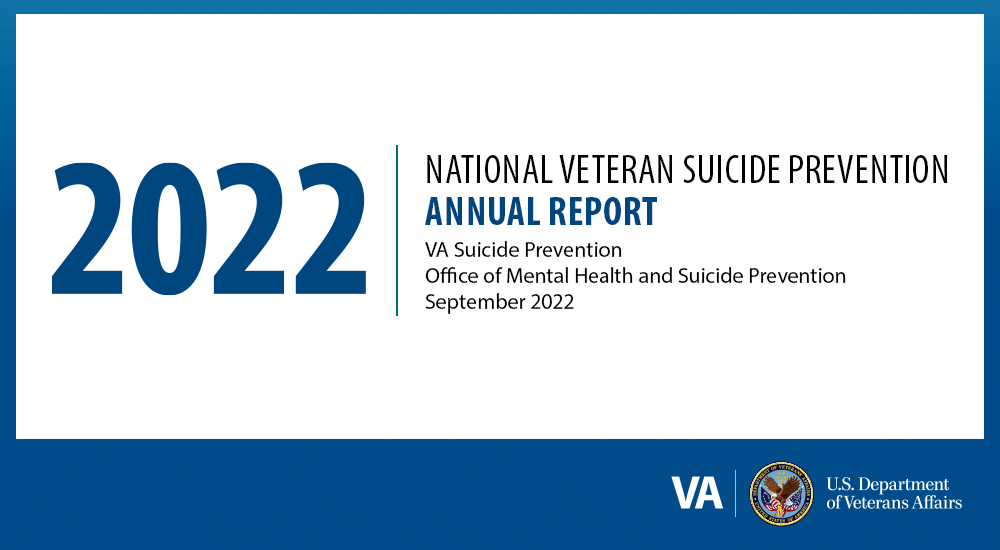VA’s latest annual report shows encouraging downward trends in Veteran suicide counts and rates, yet ongoing critical work remains. The 2022 National Veteran Suicide Prevention Annual Report analyzes Veteran suicide data from 2001-2020. Containing the most comprehensive set of data about Veteran suicide mortality to date, the report is the first to evaluate Veteran suicide during the initial period of the COVID-19 pandemic.
Key report findings
- In 2020, there were 6,146 Veteran suicide deaths, which was 343 fewer than in 2019. The unadjusted rate of suicide in 2020 among U.S. Veterans was 31.7 per 100,000.
- Over the period from 2001 to 2020, age- and sex-adjusted suicide rates for Veterans peaked in 2018 and then fell in 2019 and 2020. From 2018 to 2020, age- and sex-adjusted suicide rates for Veterans fell by 9.7%.
- Among non-Veteran U.S. adults, age- and sex-adjusted suicide rates also peaked in 2018 and fell in 2019 and 2020. From 2018 to 2020, age- and sex-adjusted suicide rates for non-Veteran adults fell by 5.5%.
- From 2019 to 2020, the age- and sex-adjusted suicide rate for Veterans fell by 4.8%, while for non-Veteran U.S. adults the adjusted rate fell by 3.6%.
- From 2019 to 2020, among Veteran men, the age-adjusted suicide rate fell by 0.7%, and among Veteran women the age-adjusted suicide rate fell by 14.1%. By comparison, among non-Veteran U.S. men, the age-adjusted rate fell by 2.1%, and among non-Veteran women the age-adjusted rate fell by 8.4%.
- Comparisons of trends in Veteran suicide and COVID-19 mortality over the course of 2020 and across Veteran demographic and clinical subgroups did not indicate an impact of the COVID-19 pandemic on Veteran suicide mortality.
The report contains information about positive progress, yet it also documents that more work is needed to further reduce Veteran suicide. That’s why VA is taking a Department-wide approach to Veteran suicide prevention that integrates strategic planning, program operations and program evaluation across VA, including the Veterans Health Administration, Veterans Benefits Administration and National Cemetery Administration.
Work has also been expanded in collaboration with other federal agencies to support a whole-of-government approach to build upon the strong foundation of VA’s 10-year National Strategy for Preventing Veteran Suicide (2018) plan and, in further work with the White House, the Reducing Military and Veteran Suicide Strategy (2021). These guiding documents outlining a public health approach combining community prevention and clinical intervention strategies have been operationalized into action through Suicide Prevention 2.0, the Suicide Prevention Now initiative, and interagency task force efforts to work across VA and the community to prevent Veteran suicide.
Highest clinical priority
Veteran suicide prevention is VA’s highest clinical priority, and we can’t do it alone. Suicide is preventable and everyone has a role to play in saving lives. Visit our website to find out how you can support Veterans. You don’t need special training and you don’t have to be an expert to help the Veterans you care about.
In addition to the 2022 National Veteran Suicide Prevention Annual Report, VA has released data sheets on state-level findings—including the number of suicide deaths among Veterans, suicide rates by age group, suicide deaths by method of suicide, and comparisons between state data and regional and national data.
If you or someone you know is having thoughts of suicide, contact the Veterans Crisis Line to receive free, confidential support and crisis intervention. It’s available 24 hours a day, 7 days a week, 365 days a year. Dial 988 then Press 1, chat online at VeteransCrisisLine.net/Chat, or text 838255.
Topics in this story
More Stories
How much do you know about VA care, benefits and services? Don’t miss out on what you've earned—check out the "2025 VA Federal Benefits Guide for Veterans, Dependents, Survivors, and Caregivers" handbook to learn more.
VA has updated its process for awarding G.I. Bill benefits. This means that many Veterans who served multiple periods of military service (for example, Veterans who reenlisted) may be eligible for additional benefits for themselves or their beneficiaries.
Summer Sports Clinic is a rehabilitative and educational sporting event for eligible Veterans with a range of disabilities.







I actually call for help for my depression and apparently, I have to wait two months to be seen, so I have to put my depression on hold until my appointment, ridiculous.
I would like to see the research that provides these numbers. Nowhere can they be found?
Also are you counting death by overdose, because that happens to be a very large group of my brothers and sisters.
My local VA hospital cares more for its staff and interns than it does the Veterans. Doctor patient confidentiality is not relevant at this hospital. If you have a problem and call the patient advocate it’s just gets swept under the rug. They will tell you they are not going to call you back. The Veteran has no rights as pertaining to serious infractions committed by staff or interns against Veterans. There is so many things that needs to be fixed at my local VA hospital. I just can’t put everything in this space.